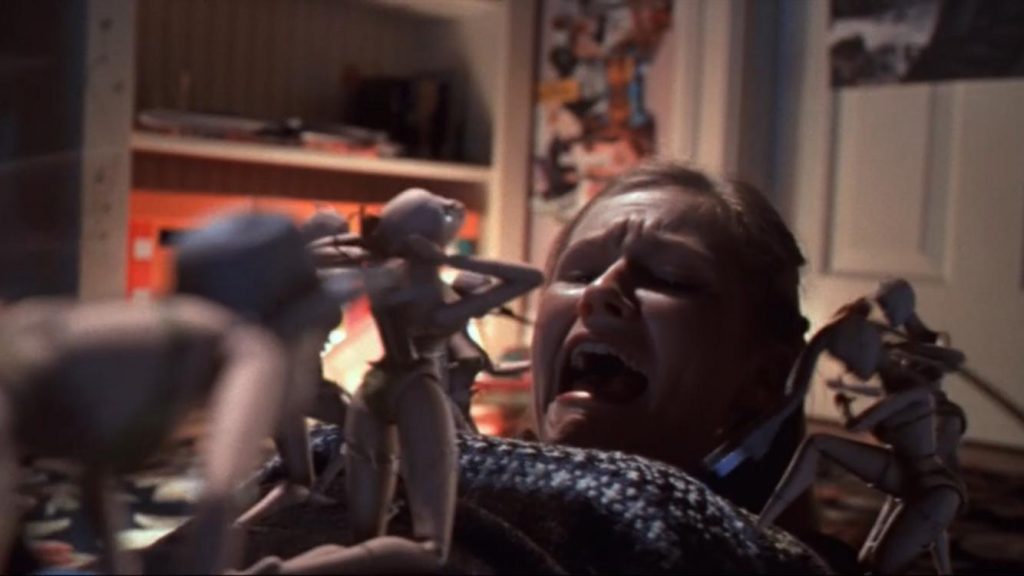
In the wake of Disney’s Toy Story (1995), DreamWorks released Joe Dante’s Small Soldiers (1998). Where Toy Story offered its audiences only superficial sensations of nostalgia, Small Soldiers delivers a scathing parody of Corporate America and a humorous analysis of war in the media. Regretfully, Toy Story has achieved an iconic status while Small Soldiers has remained an artifact from the late 1990s.
Like Gremlins, Small Soldiers turns the standard accoutrements of childhood fantasy into the stuff of Drive-In horror films. The robot toys, programmed to think and learn as advanced forms of artificial intelligence, act out the drama of their own pre-existing narrative that originates with their manufacturers (Jay Mohr, David Cross and Denis Leary). The Commando Elite figures ruthlessly pursue their objective; to eliminate the entire monster race known as the Gorgonites. Gregory Smith and Kirsten Dunst play Alan and Christy, two adolescents who are inadvertently drawn into the conflict between the toys. In this, Dante presents his audience with spectators (Alan and Christy) who must forfeit their privileged perspective and become active contributors in deciding the outcome of this conflict. This process of spectatorship recalls the “movie within a movie” device, but without being on the nose or overtly reflexive in the execution.
But Dante does instill his “toy” characters with a sense of place in cinema history, so that various signifiers allow the audience to further contextualize the characters without making a conscious effort. With the toys, Dante recreates shots from Patton, First Blood, and Toy Story. In addition, Dante serves up familiar music cues from Apocalypse Now to accentuate the action in sequences. Finally, Dante has cast Dirty Dozen veterans George Kennedy, Ernest Borgnine, Jim Brown and Clint Walker as the voices of the Commando Elite (whose leader, Chip Hazard, is voiced by Tommy Lee Jones) whilst filling out the voices of the Gorgonites with This Is Spinal Tap cast members Michael McKean, Harry Shearer and Christopher Guest. All of these components, dredged up from the history of America’s Pop Culture, become a portrait of our popular conscious in the media. Therefore, the toys themselves become totems of the media, whose interactions with the human characters (spectators) parody our own.
Alan and Christy, along with their parents (Phil Hartman, Kevin Dunn, Ann Magnuson and Wendy Schaal) are reluctant to join in the conflict at all; in fact, the parent characters resist until the final twenty minutes of the film. Naïve optimism or positive projection, it’s not for me to say why Dante’s characters take action, but their hesitance certainly speaks to a rather ugly flaw in ourselves as audience members.
This ambivalence has been linked to a variety of causes ranging from violence on T.V. to Watergate. Perhaps the greatest act of ambivalence or ignorance perpetrated by both the human characters in the film and ourselves as a wider society pertains to our relationship with big corporations. Anyone one who has seen Al Gore’s An Inconvenient Truth or any Michael Moore film is aware of corporate America’s role in legislature, the economy, and military issues, not to mention presidential elections. Corporations make toys and guns; just like in Small Soldiers, and that is, perhaps, the most unsettling aspect of the film.
The ideologies of the characters in the film are another matter. The Commando Elite are Fascistic warmongers, ignorantly pursuing their objective beyond reason. The Gorgonites, Alan and Christy are peaceful, acting only when it is a matter of self-defense. This relationship is a standard in American cinema and story telling. But Dante ties a more dangerous ignorance into his Commando Elite. They do not even attempt to reason or understand their opponents, serving as caricatures of Government corruption and genocide, Waco and Vietnam.
All things considered, for a children’s action flick, Small Soldiers delivers some sophisticated cinema. As an artifact of our culture as a whole, beyond 1998, I believe this film will become more enduring and meaningful with the passage of time than Toy Story. Maybe that’s just wishful thinking.
